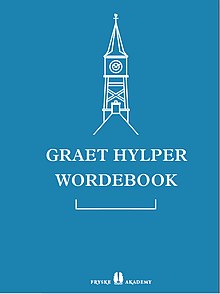lingvo.wikisort.org - Language
Hindeloopen Frisian (natively called Hylpers, and Hylpersk in standard West Frisian; also sometimes called Hindeloopers in English, as it is in Dutch) is a West Frisian dialect or language spoken in the port town of Hindeloopen and in the village of Molkwerum on the west coast of the Dutch province of Friesland. It has preserved much of the Old Frisian pronunciation and vocabulary. It is still spoken by some 300 people in Hindeloopen, almost all of them elderly, and that number is decreasing.[citation needed]
This article's tone or style may not reflect the encyclopedic tone used on Wikipedia. (May 2021) |
| Hindeloopen Frisian | |
|---|---|
| Hindeloopen–Molkwerum Frisian | |
| Hylpers | |
| Native to | Netherlands |
| Ethnicity | Frisians |
Language family | Indo-European
|
| Language codes | |
| ISO 639-3 | None (mis) |
| Glottolog | hind1273 |

Hindeloopen Frisian has been written since the 17th century. In 1981, the Fryske Akademy (Frisian Academy) published a dictionary of the language, then still seen as a dialect (Hylper Wurdboek, 1981, author: Gosse Blom). In 2006 they started developing a new dictionary which was completed in 2019 (Graet Hylper Wordebook, authors: Gosse Blom, Sybren Dyk, assisted by Wiebe Zoethout). This dictionary contains 1000 pages of words, grammar and synonyms and is considered the definitive version of the language.[1]
In 2019 Hylpers was internationally recognized as a language when Glottolog, an international scientific online database containing a comprehensive catalogue of more than 7000 of the world's languages, language families and dialects, added it into their database. The language is stored under "Language: Hindeloopen-Molkwerum Frisian" using the Glottocode "hind1273". Molkwerums (dead language) and Hindeloopers/Hylpers are seen as a unit. Why is Hylpers considered a language instead of a dialect? According to Dyami Millarson (the person responsible for getting Hylpers, along with Terschelling Frisian, in the Glottolog) "These 3 languages have a complete language system, it's not just a few words which are different from Frisian, the languages have developed separately from Frisian. Hylpers and Frisian are more different from each other than Afrikaans and Dutch".[2]
Glottolog is part of the Max Planck Institute for the Science of Human History in Jena (Germany).
The Hylper language is still being taught at the local elementary school.
Development
Due to its position on a peninsula, Hindeloopen was very isolated from the mainland until the 20th century and for centuries had more contact with the coastal cities in Holland on the other side of the South Sea. Because of this, Hindeloopen Frisian underwent greater influence from Hollandic speech than the other dialects of West Frisian. The location of Hindeloopen is, however, not a complete explanation for the dialect: until about 1800, Koudum had a dialect that was very similar to Hindeloopen.
Differences compared to Standard West Frisian
- In Hindeloopen Frisian, the l in the trigraphs âld and âlt is not silent, as it is in Standard West Frisian, and the vowel is longer.
- The Standard West Frisian tsj is reduced to tj or s; for example, tjian for the standard tsjin (against) and serke for the standard tsjerke (church).
- The digraph ae is still used instead of the modern aa.
- The standard ú is written uu.
- Non-standard letters used: ä, ö, è and ò.
There are also a few lexical differences, such as siie instead of naaie (to sew), tät instead of happe (a child’s word for “horse”) and öie instead of sipel (onion). The dialect’s vocabulary preserves many more words from Old Frisian that are no longer used elsewhere. The differences in pronunciation and vocabulary between Hindeloopen Frisian and Standard West Frisian are so big that mutual intelligibility is difficult. However, Hindeloopen Frisian has gradually become more like standard West Frisian due to increasing contact with speakers of other dialects.
References
- "Graet Hylper Wordebook: Hoe taal het leven spiegelt" Dutch, Friesch Dagblad, 23 maart 2019
- "Spreekt u al Aasters, Schiermonnikoogs of Hielpes? Dankzij Dyami Millarson (25) zijn het nu zelfstandige talen" Dutch, Trouw, 2 juni 2019
На других языках
- [en] Hindeloopen Frisian
[ru] Хинделопенский диалект
Хинделопенский диалект (з.-фриз. Hylpersk, нидерл. Hindeloopers) — это архаичный диалект западнофризского языка. На нём говорят в небольшом портовом городе Хинделопен на западном побережье нидерландской провинции Фрисландия. Диалект характеризуется консервативными фонетикой и лексикой, в которых сохранилось многое из древнефризского языка. Различия в произношении и лексике между хинделопенским и литературным западнофризским настолько велики, что их взаимопонятность находится под угрозой. На хинделопенском диалекте до сих пор говорят около 400 человек в Хинделопене, почти все они пожилые, и это число постоянно уменьшается.Другой контент может иметь иную лицензию. Перед использованием материалов сайта WikiSort.org внимательно изучите правила лицензирования конкретных элементов наполнения сайта.
WikiSort.org - проект по пересортировке и дополнению контента Википедии